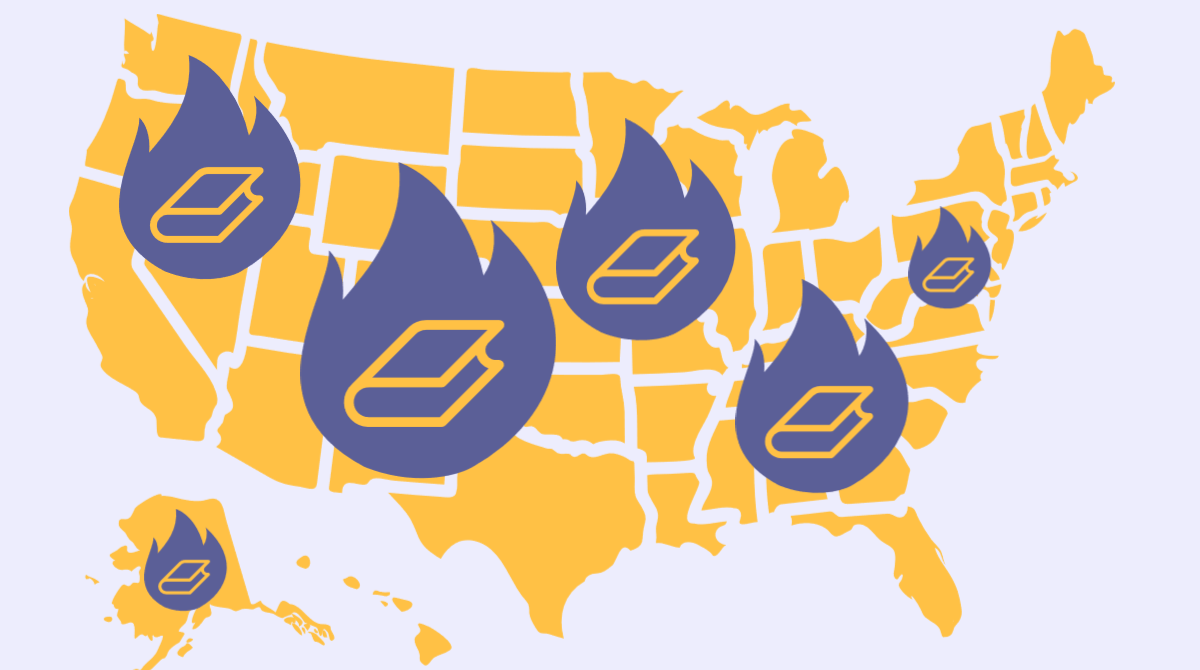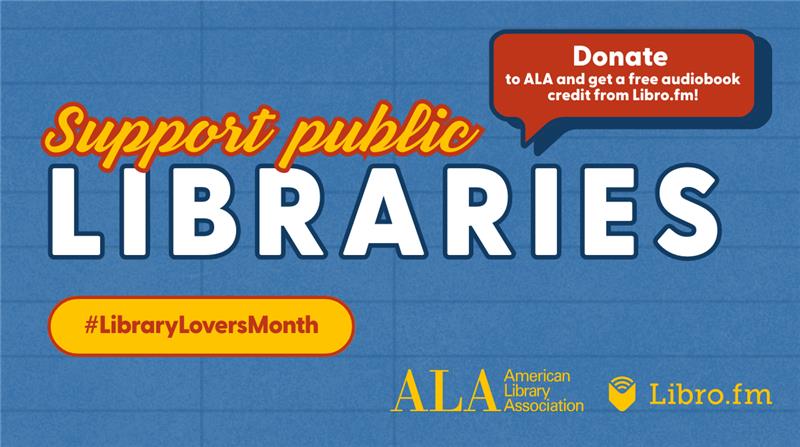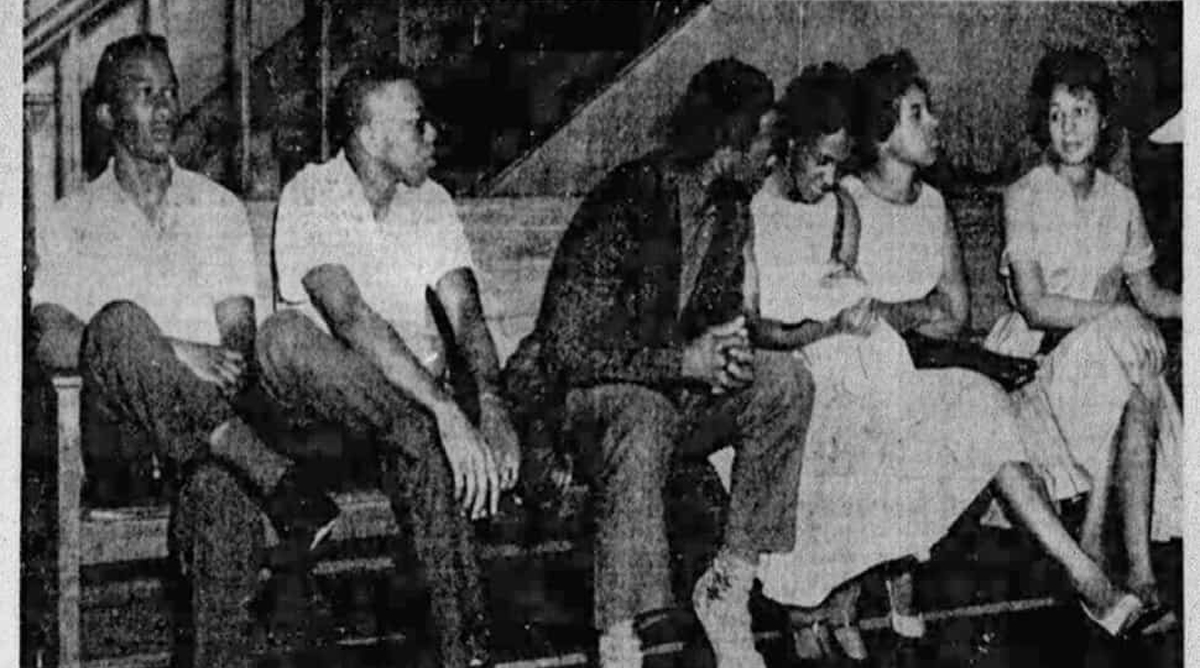Libraries and schools across the country are experiencing unprecedented levels of attempts to ban or remove books from their shelves. I Love Libraries will continue to raise awareness by highlighting attempts to censor library materials, as well as efforts by librarians, parents, students, and concerned citizens to push back against them. This roundup includes news from Florida, Missouri, California, and New Hampshire.
Teacher fired over video of bookshelves allegedly empty from DeSantis’s book banning
A Florida teacher has been fired from his job after posting a video of a school library’s empty bookshelves on social media that went viral, reports LGBTQNation. The video reportedly shows the effects of Florida governor Ron DeSantis’s ban on LGBTQ+ and racial content in schools.
Brian Covey, a substitute teacher at Mandarin Middle School in Jacksonville, posted the original video on January 27. In one of his posts about the books’ removal, he wrote, “They removed every single book from my children’s classrooms… I read books about the consequences of this when I was in school.” Two days after posting the video, Covey was informed by Education Staffing Solutions, a third-party service used by Duval County (Fla.) Public Schools, that he had been fired because he “had violated their cellphone and social media policy.”
DeSantis has publicly disavowed the video as a “fake narrative.”
Missouri ACLU, librarians sue over law that led to schools banning hundreds of books
Missouri librarians are suing over a new law that bans sexually explicit material from schools, reports the Kansas City Star. The law has led to the removal of hundreds of books from districts throughout the state, according to a lawsuit filed in Jackson County (Mo.) Court.
The American Civil Liberties Union of Missouri is suing Jackson County Prosecutor Jean Peters Baker on behalf of the Missouri Library Association (MLA) and Missouri Association of School Librarians. The suit argues the law is unconstitutional and amounts to government censorship and the suppression of students’ First Amendment rights. The law threatens librarians and other school employees who violate it with a misdemeanor, with penalty of up to a year in jail or a $2,000 fine.
“The law presents specific peril for school librarians, but also endangers the work and livelihoods of public and academic librarians who work with K-12 schools in various capacities,” said Joe Kohlburn with the MLA Intellectual Freedom Committee, in a news release. “Librarians have been undermined politically in this state for long enough, and the fear of prosecution is an ongoing issue for keeping qualified professionals in Missouri, as well as bringing new people into the profession.”
Clashes at California school board meeting over book banning
San Ramon Valley (Calif.) Unified School District’s February 21 Board of Education meeting devolved into “shouting, moral panic, and personal attacks” over the district’s library book acquisition policies, reports SFGate. The meeting was schedule to discuss the policies because of parent uproar over books with LGBTQ+ themes, specifically Gender Queer: A Memoir by Maia Kobabe. Some district parents allege the book and others like it contain pornographic materials unsuitable for children.
The school district told SFGate that Gender Queer was first put on parents’ radar in January after claims that a student at San Ramon Valley High School was punished by a teacher for refusing to read the book. The district has no record of a complaint filed over the alleged incident, and no one has come forward to corroborate any of the claims. Nevertheless, some arguments at the meeting were based on the erroneous idea that children were being forced to read Gender Queer and similar books.
Some meeting attendees also made incredibly hyperbolic remarks to try to justify books’ removal, according to SFGate. One claimed that a journal read by school librarians is “an echo chamber for twisted librarians drawn themselves to porn like flies to dog poop.” Another attendee equated offering books with LGBTQ+ themes to students as tantamount to endorsing cruelty to animals, stating that the library books “allow opportunities for students to see the lived experiences of others in order to nurture empathy and compassion,” so “if a student likes to torture and kill cats, the policy says the school board should teach other students to have empathy and compassion for him and read books about torturing and killing cats.”
K-12 obscene materials bill sparks debate in New Hampshire
House lawmakers in New Hampshire are considering a bill to remove staff and teachers in K-12 schools from exemptions to state obscenity laws, a move that may lead school officials to remove books proactively or face misdemeanor charges, reports New Hampshire Public Radio.
Since 1979, schools, museums, public libraries, and governmental agencies in New Hampshire have been shielded from charges for distributing or providing “obscene” materials, unless those materials have already been deemed by a superior court to be obscene. House Bill 514 would redefine that exemption, specifying that “school” means “institution in the university system or community college system of New Hampshire” and not K-12 schools. The change would mean employees of K-12 schools could be subjected to charges under the obscenity law even if the materials in question had not been previously adjudicated by a state court.
Opponents of the bill say it will allow parents to ban books and other materials from school libraries and classrooms.
Take action
Alarmed by the escalating attempts to censor books? Here are five steps you can take now to protect the freedom to read.
1. Follow news and social media in your community and state to keep apprised of organizations working to censor library or school materials.2. Show up for library workers at school or library board meetings and speak as a library advocate and community stakeholder who supports a parent’s right to restrict reading materials for their own child but not for all
3. Help provide a safety net for library professionals as they defend intellectual freedom in their communities by giving to the LeRoy C. Merritt Humanitarian Fund.
4. Educate friends, neighbors, and family members about censorship and how it harms communities. Share information from Banned Books Week.
5. Join the Unite Against Book Bans movement to learn what you can do to defend the freedom to read in your community.


